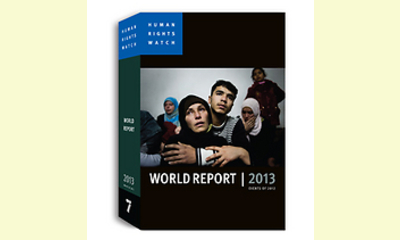|
|
Human Rights Watch World Report 2013: Challenges for Rights After Arab Spring
an article by Human Rights Watch (abridged)
Video: Human Rights Watch Annual Report
The euphoria of the Arab Spring has given way to the sobering challenge of creating rights-respecting democracies, Human Rights Watch said today in issuing its World Report 2013. The willingness of new governments to respect rights will determine whether those uprisings give birth to genuine democracy or simply spawn authoritarianism in new forms.

click on photo to enlarge
In the 665-page report, its 23rd annual review of human rights practices around the globe, Human Rights Watch summarizes major issues in more than 90 countries. With regard to events in the Middle East and North Africa known as the Arab Spring, Human Rights Watch said the creation of a rights-respecting state can be painstaking work that requires building effective institutions of governance, establishing independent courts, creating professional police, and resisting the temptation of majorities to disregard human rights and the rule of law. But the difficulty of building democracy does not justify seeking a return to the old order, Human Rights Watch said.
“The uncertainties of freedom are no reason to revert to the enforced predictability of authoritarian rule,” said Kenneth Roth, executive director of Human Rights Watch. “The path ahead may be treacherous, but the alternative is to consign entire countries to a grim future of oppression.”
The tension between majority rule and respect for rights poses perhaps the greatest challenge for the new governments, Human Rights Watch said. Leaders in the Middle East are naturally eager to exercise their new electoral clout, but they have a duty to govern without sacrificing fundamental freedoms or the rights of minorities, women, and other groups at risk.
Other countries can be supportive both by setting positive examples in their own practices, respecting human rights themselves, and by consistently promoting rights in their relations with the new government and others. Turning a blind eye to repression may be politically convenient but it does enormous damage to the quests for rights-respecting democracies, Human Rights Watch said.
Three additional essays in the World Report address other threats to human rights. One describes the need to regulate business operations around the world, especially in an era of globalization, to protect the rights of workers and people negatively affected by company operations. The second says that inresponding to environmental crises, governments and others frequently focus on the harm to nature, neglecting the human rights impact on people in the crisis zone. The third essay highlights how arguments of “tradition” and cultural relativism are used to deny women and minorities human rights that should be universal. . .
(Click here for a French version of this article or here for a Spanish version of this article. )
|








|
DISCUSSION
Question(s) related to this article:
What is the state of human rights in the world today?,
* * * * *
Latest reader comment:
Each year we get overviews of the state of human rights in the world from Amnesty International and Human Rights Watch.

|
|









